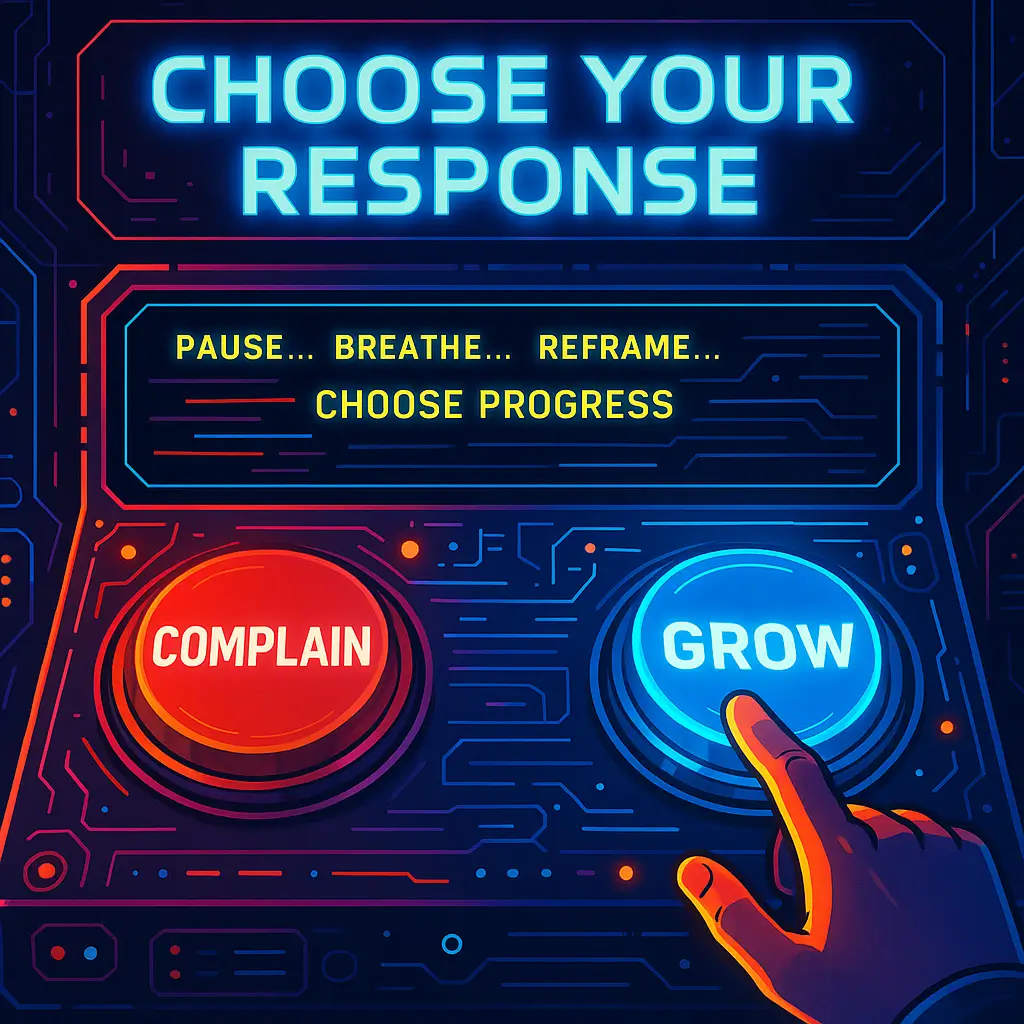Complaining has become second nature for many of us. Whether it’s grumbling about traffic, criticizing coworkers, or lamenting the weather, negative commentary seems to flow effortlessly from our lips. While venting occasionally can provide temporary relief, chronic complaining creates a destructive cycle that impacts our mental health, relationships, and overall life satisfaction.
Learning how to stop complaining isn’t just about becoming more pleasant to be around—it’s about fundamentally transforming your mindset from a fixed victim perspective to a growth owner mentality, creating space for genuine happiness and progress across all areas of your life. When we shift from constantly focusing on what’s wrong to actively seeking solutions and opportunities for growth, we unlock the potential for meaningful change.
The journey to break free from complaining so much begins with understanding that this habit doesn’t just affect our mood. It creates a ripple effect that touches every aspect of our existence. From our career success and financial well-being to our relationships and physical health, chronic negativity acts like a poison that slowly erodes our potential for living a balanced, fulfilling life. The good news? With the right strategies and commitment to incremental change, transformation is not only possible but inevitable.
Why Do People Complain So Much?
Understanding why people complain so much reveals that this behavior often stems from deeper psychological patterns—seeking temporary emotional relief, social bonding through shared grievances, and avoiding personal responsibility for creating positive change. Breaking free from this habit requires recognizing these underlying motivations and developing healthier alternatives.
Emotional Relief:
One primary reason why do people complain excessively is the temporary emotional relief it provides. When we voice our frustrations, we experience a brief sense of validation and connection with others who might share our grievances. This creates a dopamine hit that reinforces the behavior, making complaining feel rewarding in the moment. This is very similar to how our brains respond to social media or other instant gratification activities.
Social Bonding:
Social bonding also plays a significant role in chronic complaining patterns. Shared complaints can create instant connections between strangers and strengthen existing relationships through mutual understanding of shared struggles. Office workers bond over difficult managers, parents connect through parenting challenges, and neighbors unite over neighborhood issues. While this can foster temporary connections, it often prevents deeper, more meaningful relationships based on shared growth and positive experiences.
Lack of Control:
Additionally, complaining often stems from a sense of powerlessness or lack of control. When people feel unable to change their circumstances, voicing dissatisfaction becomes a way to express agency, even if that expression doesn’t lead to meaningful action. This explains why people might repeatedly complain about the same issues without taking steps to address them—they’ve adopted a fixed victim mindset rather than embracing their power as growth owners of their own experience.
Fear of Taking Responsibility:
Fear of taking responsibility also contributes to chronic complaining. By focusing on external factors and other people’s shortcomings, individuals can avoid examining their own role in their dissatisfaction or taking difficult steps toward improvement. This pattern keeps them stuck in cycles of negativity rather than moving toward the solutions that could actually improve their circumstances.
Related Article: How to Manage the Fear of Failure
Why Do I Complain So Much? Self-Reflection and Awareness
If you find yourself asking “why do i complain so much,” honest self-reflection is the first step toward developing the self-awareness necessary for meaningful transformation. Without awareness, there is no choice—and without understanding your unique patterns and triggers, lasting change remains elusive.
Consider these essential questions to better understand your complaining patterns and develop greater self-awareness:
Emotional Triggers: What situations, people, or circumstances most frequently trigger your complaints? Are you more likely to complain when you’re stressed, tired, or overwhelmed? Identifying these patterns helps you recognize when you’re most vulnerable to negative thinking and prepares you to respond differently in those moments.
Underlying Needs: What are you really seeking when you complain? Are you looking for sympathy, validation, solutions, or simply someone to listen? Understanding your underlying needs can help you find more constructive ways to meet them—perhaps through direct communication, problem-solving, or seeking support in healthier ways.
Control and Agency: Do your complaints focus on things within or outside your control? If you frequently complain about unchangeable circumstances like weather or other people’s behavior, you might be avoiding focusing on areas where you actually have power to create change. Growth owners focus their energy on what they can influence.
Habit vs. Genuine Concern: Have some of your complaints become automatic responses rather than expressions of genuine concern? Sometimes we complain simply because it’s become our default way of engaging with the world, much like reaching for our phone when we’re bored.
Developing this level of self-awareness is crucial because it allows you to catch complaining patterns before they take hold and redirect your energy toward more productive responses. This awareness also helps you understand which areas of your life need the most attention and growth.
Read More: How to Stop Complaining in a Relationship
The Hidden Costs of Chronic Complaining Across All Life Areas
Before diving into transformation strategies, it’s essential to understand the toll that complaining so much takes on aspects of life. The habit of complaining so much creates a ripple effect that damages not just your mindset, but impacts your career success, relationships, physical health, and emotional well-being—essentially undermining progress in all core areas of a fulfilling life.
Mental Health and Mindset Impact:
Constant complaining rewires your brain to notice and focus on negative aspects of situations automatically. This creates a pessimistic worldview that can contribute to anxiety, depression, and chronic stress. The more you complain, the more reasons your brain finds to be dissatisfied, creating a self-perpetuating cycle that makes happiness increasingly elusive.
Career and Financial Consequences:
In workplace settings, chronic complainers often find themselves passed over for promotions, excluded from important projects, or even facing termination. Employers value positive team members who contribute to constructive work environments and focus on solutions rather than problems. This directly impacts your earning potential and career trajectory.
Relationship Strain and Social Isolation:
While occasional venting can strengthen relationships, chronic complaining pushes people away. Friends, family members, and colleagues may begin to avoid interactions with someone who consistently brings negative energy to conversations. This social isolation can create a vicious cycle where loneliness leads to more complaining, further damaging your support network.
Physical Health Effects:
The stress associated with constant negativity manifests in physical symptoms including headaches, muscle tension, digestive issues, and compromised immune function. Your body responds to chronic complaining as if you’re under constant threat, leading to elevated cortisol levels and inflammation that can impact your long-term health and energy levels.
Emotional and Mental Well-being:
Chronic complaining erodes your emotional resilience and mental clarity. It becomes increasingly difficult to experience joy, gratitude, and contentment when your default mental state focuses on what’s wrong rather than what’s possible. This emotional pattern can prevent you from pursuing passions and engaging in activities that bring genuine fulfillment.
The interconnected nature of these effects demonstrates how addressing complaining habits can create positive momentum across all areas of life, leading to what we might call a “5-core transformation” where improvements in mindset naturally enhance career success, relationships, physical health, and emotional well-being.
Read More: Feeling Lost in Life
How to Stop Complaining: Science-Backed Transformation Strategies
Learning how to stop complaining so much requires replacing destructive patterns with principle-centered habits that create momentum toward positive change, using science-backed strategies that make transformation both achievable and sustainable. The key is to approach this change systematically, focusing on small, incremental improvements that compound over time.
Breaking the complaining habit requires intentional effort and consistent practice. These evidence-based strategies can help you develop more constructive communication patterns and a healthier mindset while building the discipline necessary for lasting change.
Immediate Action Steps
Practice the 24-Hour Rule: Before voicing a complaint, commit to waiting 24 hours. This cooling-off period allows you to process your emotions and determine whether the issue truly warrants discussion or if it’s simply a momentary frustration. Often, you’ll find that the urgency to complain diminishes with time, and you can approach the situation with greater clarity and perspective.
Transform Complaints into Solutions: When you feel the urge to complain, pause and ask yourself: “What would I like to see happen instead?” This shifts your focus from problems to possibilities, embodying the growth owner mindset. Instead of saying “This traffic is terrible,” try “I could use this time to listen to an audiobook, practice mindfulness, or plan my day.”
Implement the Three-Before-Me Rule: Before complaining about someone else’s behavior, identify three things you could do differently to improve the situation. This practice encourages personal accountability and often reveals that you have more control than initially recognized. It transforms you from a passive victim of circumstances into an active creator of your experience.
Use the STOP Technique: When you catch yourself beginning to complain, use this acronym:
- Stop what you’re saying
- Take a deep breath
- Observe your emotions and thoughts
- Proceed with intentional, constructive communication
This creates a pattern interrupt that allows you to choose your response rather than reacting automatically.
Building Long-Term Success Patterns
Create Complaint-Free Zones: Designate specific times, places, or relationships as complaint-free zones. This might mean avoiding negative talk during family dinners, refraining from complaints in your bedroom to protect your sleep environment, or committing to positive communication with certain supportive friends. These zones create space for more positive interactions and help rewire your default communication patterns.
Practice Active Gratitude: For every complaint that crosses your mind, intentionally identify three things you’re grateful for in that moment. This rewires your brain to notice positive aspects of situations rather than automatically focusing on problems. Make this a daily habit by keeping a gratitude journal or setting phone reminders to practice appreciation throughout the day. Related Article: Fun Gratitude Activities for Adults
Develop Solution-Focused Communication: When you must address problems, frame them as opportunities for improvement and come prepared with potential solutions. This demonstrates leadership and constructive thinking while maintaining your reputation as someone who contributes positively to any situation. Read More: What Makes Life Worth Living
Build New Communication Habits: Replace complaining with expressing appreciation, asking curious questions, offering support to others, and sharing solutions. These alternatives fulfill the same social needs that complaining might have served but in ways that strengthen rather than damage your relationships and mindset.
Creating Your Personal Growth System:
The most effective approach to how to stop complaining involves creating a personalized system that addresses your unique triggers, circumstances, and goals. This systematic approach ensures that your efforts compound over time rather than relying on willpower alone.
Track Your Progress:
Create a simple tracking system to monitor your complaining habits and celebrate improvements. This might involve keeping a daily journal where you note instances of complaining and successful redirections, or using a habit-tracking app to build awareness of your patterns. The act of measurement alone often leads to improvement.
Identify Your Personal Triggers:
Develop awareness of the specific situations, emotions, or circumstances that most frequently lead to complaining. Common triggers include stress, fatigue, hunger, feeling overwhelmed, or interacting with certain people. Once you know your triggers, you can prepare alternative responses and create supportive environments.
Build Your Support System:
Surround yourself with people who model positive communication and constructive problem-solving. Share your commitment to reducing complaining with trusted friends or family members who can provide gentle accountability and encouragement. Consider joining communities focused on personal growth and positive mindset development.
Create Environmental Cues:
Design your environment to support positive thinking and communication. This might involve posting inspirational quotes, setting phone wallpapers that remind you of your goals, or creating visual cues that prompt gratitude and solution-focused thinking.
Develop Replacement Habits:
For each complaining pattern you identify, develop a specific alternative behavior. If you typically complain about your commute, create a playlist of uplifting music or educational podcasts. If you complain about work stress, develop a brief meditation or breathing practice you can use instead.
The key is to make these changes gradually and systematically, building momentum through small wins that compound into significant transformation over time. Remember that sustainable change happens through consistent daily actions rather than dramatic overnight shifts.
Maintaining Long-Term Transformation
Sustainable transformation requires ongoing commitment and self-compassion. Remember that breaking a deeply ingrained habit takes time, and occasional setbacks are normal parts of the process rather than evidence of failure.
Set realistic goals for yourself, such as reducing complaints by 50% in the first month rather than eliminating them entirely. Track your progress and celebrate small victories to maintain motivation. Focus on progress rather than perfection, recognizing that each positive choice builds momentum toward lasting change.
When you do slip back into complaining, practice self-forgiveness and view it as valuable information about your triggers and stress levels. Use these moments as opportunities to refine your strategies and deepen your self-awareness rather than reasons to abandon your growth efforts.
Read More: How to Get Your Life Back on Track
Conclusion: How to Stop Complaining so Much
Learning how to stop complaining is a powerful step toward creating a more fulfilling, positive life. By understanding why we complain, recognizing the comprehensive costs of chronic negativity, and implementing practical strategies for change, you can break free from destructive patterns and develop more constructive ways of engaging with the world.
Remember that this transformation benefits not only you but everyone around you. As you model positive communication and problem-solving approaches, you contribute to creating more supportive, solution-focused environments in your personal and professional relationships.
The journey to stop complaining isn’t about suppressing legitimate concerns or pretending problems don’t exist. Instead, it’s about developing the emotional intelligence and communication skills to address challenges constructively while maintaining a fundamentally optimistic outlook on life. With consistent practice and patience with yourself, you can create lasting change that enhances every aspect of your daily experience.
Ready to Transform Your Mindset and Level Up Your Life?
The strategies you’ve just learned are part of a larger system designed to help you break free from limiting patterns. If you’re ready to stop being a victim of your circumstances and start taking ownership of your growth, it’s time to discover the science-backed, gamified approach that makes personal transformation simple, fun, and ethically addictive.
The Moore Momentum System takes everything you’ve learned about stopping complaining. By building positive habits in each area, you create a ripple effect where success in one core naturally enhances the others, helping you fire on all cylinders.
🎯 Take the Core Values Quiz – Discover which of the 5 Core Areas needs your attention first and get personalized strategies to start building unstoppable momentum in your life.






